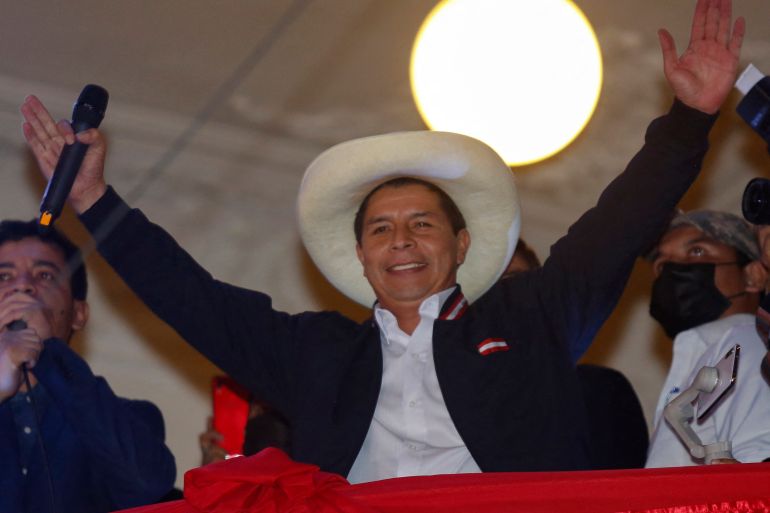In divided Peru, Castillo says looking to form pluralistic gov’t
Peruvian President-elect Pedro Castillo’s victory is confirmed after weeks of uncertainty that fuelled deep divisions.

Peru’s President-elect Pedro Castillo has said he would be looking to form a pluralistic government, in his first remarks to reporters after his election victory was confirmed in the deeply divided South American nation.
The leftist teachers’ union leader said on Tuesday that he plans to form a “work team” made up of people from different political persuasions.
Keep reading
list of 3 itemsUncertainty lingers as Peru edges closer to Castillo presidency
Presumed President-elect Pedro Castillo faces challenges in Peru
Peru’s electoral jury confirmed Castillo’s narrow victory over right-wing rival Keiko Fujimori on Monday, more than six weeks after a presidential runoff that further polarised the country, which has been hard hit by COVID-19 and has seen years of political instability.
“We are making a call to all experts and technicians, to the most distinguished and committed people in the country,” said Castillo, who will be inaugurated next week.
“We are structuring a work team and I see there are also people who are interested in contributing to support this government, from all across the political spectrum.”
The results of the runoff were delayed as Fujimori had alleged – without any evidence – that the vote was plagued by widespread voter fraud. Her legal team had sought to disqualify thousands of votes.
But international observers including the Organization of American States (OAS) said they found no evidence of serious irregularities.
Fujimori – the daughter of ex-President Alberto Fujimori, jailed for human rights abuses – said she would accept the result, but repeated her claim that Castillo had stolen votes to win and called on her supporters to mobilise to “defend democracy”.
Castillo has said he wants to increase spending on healthcare and education by raising funds from mining tax increases. His plans have resonated in a country with the highest per capita death toll from COVID-19 and wide gaps between rural and urban wealth.
But experts have said many of his policies – and his plan to implement them – remain unclear.
“Even after being elected, Castillo remains an unknown,” Gonzalo Banda, a political scientist at Peru’s Catholic University of Santa Marta, told Al Jazeera before the official results were announced on Monday.
Castillo is expected to face other hurdles, especially in Peru’s unicameral parliament, where his party will have 37 legislators out of the 130 members while Fujimori’s Popular Force party will have 24 seats, the second biggest bloc.
Peru has seen large protests in recent weeks from both Castillo and Fujimori supporters. Castillo’s backers had urged the electoral authorities to respect the will of the Peruvian people, while Fujimori’s wanted an investigation into their preferred candidate’s fraud allegations.
“I ask for calm and serenity from the Peruvian people. That’s not just the government’s responsibility but also that of all Peruvians,” Castillo said.
He must soon announce his cabinet and appointments to key ministries.